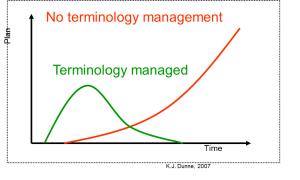Hope is the only positive emotion growing under bad conditions.
So, if you are about to start with a translation or terminology project:
Fear the worst, yearn for the BETTER. Or better for the BEST.

If, at the end of the project, your (positive) expectations are not only met,
but exceeded, you and your supplier (or: you and your customer) did a real good job.
And: Keep hoping in difficult times and project phases.
Remember the terminology pain curve:

When you don‘t care at all about terminology management,
you‘ll go away with it for a certain time, but then pain will explode
and you‘ll get a perfect terminology emergency. On the other hand,
if you are brave and do tackle terminology issues, it might terribly
hurt in the beginning, but gets better soon.
One of my favourite sayings is: „Necessity is the mother of invention“.
What does that mean with relation to translation and terminology issues?
It means that, sooner or later, we are forced to deal with terminology issues
anyhow. My point here is: Do it better sooner than later: In the phases of
product development and innovation, there‘s the ideal moment to do
terminology work and management at professional level.
Let‘s hope that the necessity of time pressure, delivery costs and product liability
will be the mother of terminology inventions – existing ones and new ones.
At least it did work with a well-known German car maker, who included
terminology management in this very first phase.

If you are disappointed by your Language Service Provider (LSP) and his or her
terminology solutions, let‘s hope together that next time it will be different, and
give him or her and yourself a second chance.
After budget cuts, project failure, crisis and nightmares, there is not only
post-traumatic stress but also post-traumatic growth, as we now from
Positive Psychology and Martin Seligman.

If we are ready to learn from our mistakes, if we analyze and discuss
why our term bank is not used or maintained, we‘ll do a better job next time.
And let‘s hope that there‘s a next time…
By the way, in the German speaking world, ‘hope’ is not that much appreciated.
You know why?
Because HOPE obviously is too passive for the German taste. It suggests that you
have to sit and wait and just do nothing, just hoping and praying. German speaking
people usually prefer the active notion of ‘Zuversicht’, which means confidence or trust.
Well, being a German speaking person myself, I can confirm that I didn’t like
‘hope’ too much in the past, but preferred ‘confidence’. Today, it is just
the opposite: I am really fond of the notion of hope.
You know why?
Maybe because I am 50+ and grew a little bit wiser, in terms of knowing
that there are a LOT of things we can NOT change or even influence.
As it is so brilliantly expressed in the so-called Serenity Prayer,
written by the American theologian Reinhold Niebuhr (1892–1971).
The best-known form is:
God, grant me the serenity to accept the things I cannot change,
Courage to change the things I can,
And wisdom to know the difference.
If we can not change or influence things, we still can hope for the
better and for the best. This can be very much comforting, I think.

And why serenity is so important for our language industry you can read
in my blog post about this positive emotion: www.termnet.eu/blog
Enjoy terminology and hope for the best,
All the best,
Gabriele
Head of the TermNet Group
P.S.: This blog post is part of the TermNet Anniversary Challenge,
series “The Top 10 Must Haves in Terminology”: #5 Hope